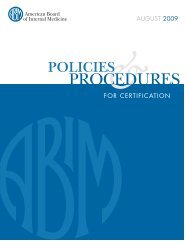The SRA Symposium - College of Medicine
The SRA Symposium - College of Medicine
The SRA Symposium - College of Medicine
Create successful ePaper yourself
Turn your PDF publications into a flip-book with our unique Google optimized e-Paper software.
list <strong>of</strong> all notices that have been received, together with explicit instructions for preparing and submitting<br />
their preproposal. Full disclosure to all <strong>of</strong> the investigators involved and their project titles<br />
can have beneficial results, as it signals the candidates <strong>of</strong> the level <strong>of</strong> internal competition, and on<br />
occasion it can trigger collaborations and/or early withdrawals.<br />
Requirements for preproposals should be clearly spelled out, and they should be tailored to the<br />
needs <strong>of</strong> each specific grant program. Preproposals are just that: concise project summaries that<br />
give reviewers enough details to judge their relative merits. A maximum <strong>of</strong> three pages is sufficient<br />
for most programs, and PI’s should be instructed to reference the program announcement in two<br />
important ways: (a) show specifically how the project will meet the sponsor’s program goals and<br />
objectives; and (b) use the sponsor’s instructions for proposal preparation to outline the preproposal.<br />
This forces investigators to scrutinize the sponsor’s requirements in greater detail, and it<br />
assures a solid head start for the PI who is selected to write the full proposal. It is well to remind<br />
PI’s at the outset that the selection committee consists <strong>of</strong> their own hard working colleagues who<br />
do not appreciate small fonts, crowded margins, lack <strong>of</strong> subject headings or documents that exceed<br />
page limits. In other words, when it comes to writing preproposals (or full proposals for that matter)<br />
more is not more.<br />
Rule 6: Choose selection committees carefully<br />
Selection committees are the foundation <strong>of</strong> the whole process. Functioning as internal grant<br />
review panels, each group must include the appropriate range <strong>of</strong> scholarly expertise, and their<br />
deliberations must result in the best possible outcomes for the university, i. e., they must consistently<br />
select those proposals with the best chances for success. Any evidence <strong>of</strong> bias or inability to<br />
properly evaluate the merit <strong>of</strong> proposed projects would seriously undermine the integrity <strong>of</strong> the<br />
entire enterprise. Deans and department heads should take the lead in putting the panel together;<br />
they are the best judges <strong>of</strong> who should or should not serve on any given committee, and they have<br />
a vested interest in maintaining quality and fairness over the long run. Selecting the right panel<br />
members can be challenging even in large universities, as faculty with the appropriate expertise<br />
<strong>of</strong>ten have conflicts <strong>of</strong> interest. Moreover, as sponsors increasingly stress interdisciplinarity, some<br />
proposals can have a breadth <strong>of</strong> scope that stretches beyond the abilities <strong>of</strong> a small group <strong>of</strong> reviewers<br />
to evaluate fairly.<br />
Rule 7: Nurture the selection committee<br />
<strong>The</strong> research administrator serves in a classic staffing role to the selection committee. This means<br />
taking every opportunity to inform, assist, and simplify life for every member. Among the helping<br />
steps that make this assignment less onerous to committee members are: (a) sending an initial<br />
note thanking them for <strong>of</strong>fering to serve and instructing them as to the committee’s working<br />
procedures and probable calendar; (b) delivering a package with hard copy <strong>of</strong> all preproposals<br />
together with the program announcement to their <strong>of</strong>fices (saves them time from downloading,<br />
printing and compiling the correct stack <strong>of</strong> documents); and (c) assuring that their meeting room<br />
is as convenient and comfortable as possible. When it comes to amenities, morning c<strong>of</strong>fee or box<br />
lunches are always wise investments.<br />
Rule 8: Be a catalyst, not a participant in the selection process<br />
Papers<br />
During the committee meeting, the research administrator should be a facilitator, not a voter. This<br />
means guiding the discussion in a nondirective, yet structured manner aimed at achieving a consensus<br />
ranking <strong>of</strong> the preproposals. Always start by reviewing the essential features <strong>of</strong> each grant<br />
program, with special emphasis on program goals and review criteria. It is important to resist any<br />
group’s tendency to move too quickly to a voting mode. This can be done by encouraging general<br />
2005 <strong>Symposium</strong> Proceedings Book 217

















